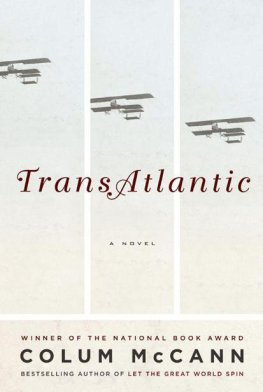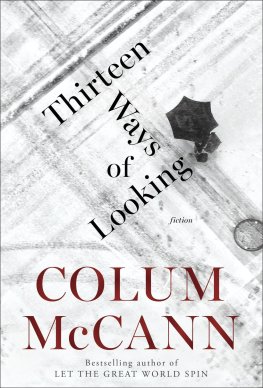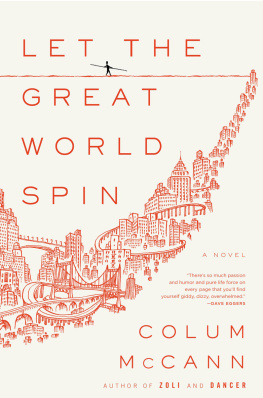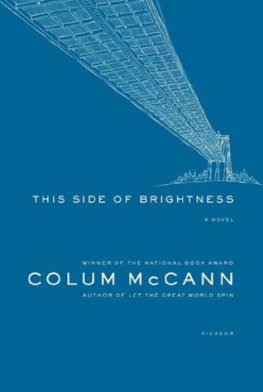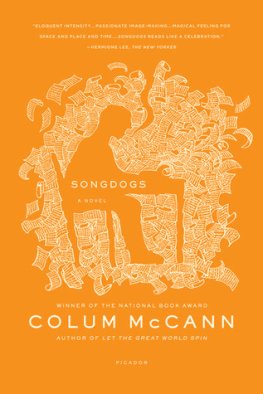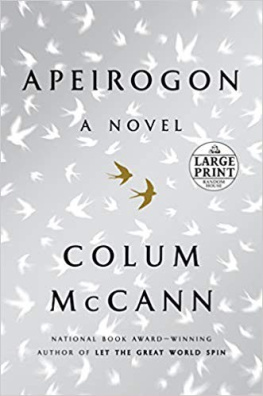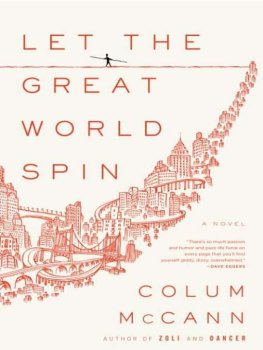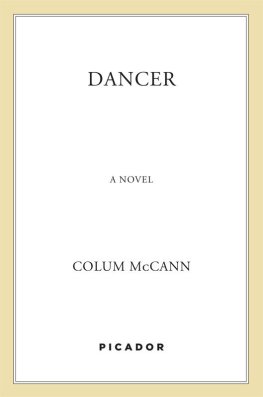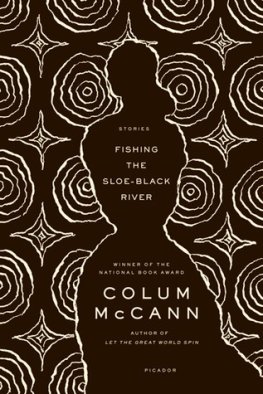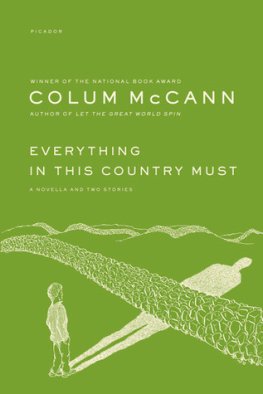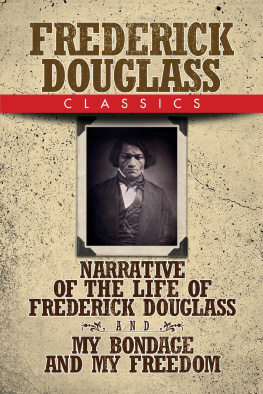Colum McCann
TransAtlantic
This novel is dedicated to Loretta Brennan Glucksman.
For Allison, and Isabella too.
And, of course, for Brendan Bourke.
No history is mute. No matter how much they own it, break it, and lie about it, human history refuses to shut its mouth. Despite deafness and ignorance, the time that was continues to tick inside the time that is.
EDUARDO GALEANO
THE COTTAGE SAT AT THE EDGE OF THE LOUGH. SHE COULD HEAR the wind and rain whipping across the expanse of open water: it hit the trees and muscled its way into the grass.
She began to wake early in the morning, even before the children. It was a house worth listening to. Odd sounds from the roof. She thought, at first, that it might be rats scuttling across the slate, but she soon discovered that it was the gulls flying overhead, dropping oysters on the roof to break the shells open. It happened mostly in the morning, sometimes at dusk.
The shells pinged first, silent a moment as they bounced, followed by a jingling roll along the roof until they tumbled down into the long grass, spotted with whitewash.
When a shell tip hit directly, it cracked open, but if it dropped sideways through the sky it wouldnt break: it lay there like a thing unexploded.
The gulls swooped, acrobatic, upon the broken shells. Their hunger briefly solved, they flapped off towards the water once more, in squadrons of blue and gray.
Soon the rooms began to stir, the opening of windows, cupboards and doors, the wind off the lough moving through the house.
IT WAS A MODIFIED BOMBER. A VICKERS VIMY. ALL WOOD AND LINEN and wire. She was wide and lumbering, but Alcock still thought her a nippy little thing. He patted her each time he climbed onboard and slid into the cockpit beside Brown. One smooth motion of his body. Hand on the throttle, feet on the rudder bar, he could already feel himself aloft.
What he liked most of all was rising up over the clouds and then flying in clean sunlight. He could lean out over the edge and see the shadowshift on the whiteness below, expanding and contracting on the surface of the clouds.
Brown, the navigator, was more reserved it embarrassed him to make such a fuss. He sat forward in the cockpit, keen on what clues the machine might give. He knew how to intuit the shape of the wind, yet he put his faith in what he could actually touch: the compasses, the charts, the spirit level tucked down at his feet.
IT WAS THAT time of the century when the idea of a gentleman had almost become myth. The Great War had concussed the world. The unbearable news of sixteen million deaths rolled off the great metal drums of the newspapers. Europe was a crucible of bones.
Alcock had piloted air-service fighters. Small bombs fell away from the undercarriage of his plane. A sudden lightness to the machine. A kick upwards into the night. He leaned out from his open cockpit and watched the mushroom of smoke rise below. His plane leveled out and turned towards home. At times like that, Alcock craved anonymity. He flew in the dark, his plane open to the stars. Then an airfield would appear below, the razor wire illuminated like the altar of a strange church.
Brown had flown reconnaissance. He had a knack for the mathematics of flight. He could turn any sky into a series of numbers. Even on the ground he went on calculating, figuring out new ways to guide his planes home.
BOTH MEN KNEW exactly what it meant to be shot down.
The Turks caught Jack Alcock on a long-range bombing raid over Suvla Bay and pierced the plane with machine-gun fire, knocked off his port propeller. He and his two crewmen ditched at sea, swam to shore. They were marched naked to where the Turks had set up rows of little wooden cages for prisoners of war. Open to the weather. There was a Welshman beside him who had a map of the constellations, so Alcock practiced his navigation skills, stuck out under the nailheaded Turkish night: just one glance at the sky and he could tell exactly what time it was. Yet what Alcock wanted more than anything was to tinker with an engine. When he was moved to a detention camp in Kedos, he swapped his Red Cross chocolate for a dynamo, traded his shampoo for tractor parts, built a row of makeshift fans out of scrap wire, bamboo, bolts, batteries.
Teddy Brown, too, had become a prisoner of war, forced to land in France while out on photographic reconnaissance. A bullet shattered his leg. Another ruptured the fuel tank. On the way down he threw out his camera, tore up his charts, scattered the pieces. He and his pilot slid their B.E.2c into a muddy wheatfield, cut the engine, held their hands up. The enemy came running out of the forest to drag them from the wreck. Brown could smell petrol leaking from the tanks. One of the Krauts had a lit cigarette in his lips. Brown was known for his reserve. Excuse me, he called out, but the German kept coming forward, the cigarette flaring. Nein, nein. A little cloud of smoke came from the Germans mouth. Browns pilot finally lifted his arms and roared: For fucksake, stop!
The German paused in midstride, tilted his head back, paused, swallowed the burning cigarette, ran towards the airmen again.
It was something that made Browns son, Buster, laugh when he heard the story just before he, too, went to war, twenty years later. Excuse me. Nein, nein. As if the German had only the flap-end of his shirt sticking out, or had somehow neglected to tie his shoelace properly.
BROWN WAS SHIPPED home before the armistice, then lost his hat high in the air over Piccadilly Circus. The girls wore red lipstick. The hems of their dresses rose almost to their knees. He wandered along the Thames, followed the river until it crawled upwards to the sky.
Alcock didnt make it back to London until December. He watched men in black suits and bowler hats pick their way amid the rubble. He joined in a game of football in an alley off the Pimlico Road, knocking a round pigskin back and forth. But he could already sense himself aloft again. He lit a cigarette, watched the smoke curl high and away.
WHEN THEY MET for the first time in the Vickers factory in Brooklands, in early 1919, Alcock and Brown took one look at each other and it was immediately understood that they both needed a clean slate. The obliteration of memory. The creation of a new moment, raw, dynamic, warless. It was as if they wanted to take their older bodies and put their younger hearts inside. They didnt want to remember the bombs that had dudded out, or the crash or burn, or the cellblocks they had been locked into, or what species of abyss they had seen in the dark.
Instead they talked about the Vickers Vimy. A nippy little thing.
THE PREVAILING WINDS blew east from Newfoundland, pushing hard and fast across the Atlantic. Eighteen hundred miles of ocean.
The men came by ship from England, rented rooms in the Cochrane Hotel, waited for the Vimy to arrive at the docks. It came boxed in forty-seven large wooden crates. Late spring. A whip of frost still in the air. Alcock and Brown hired a crew to drag the crates up from the harbor. They strapped the boxes to horses and carts, assembled the plane in the field.
The meadow sat on the outskirts of St. Johns, on a half-hill, with a level surface of three hundred yards, a swamp at one end, and a pine forest at the other. Days of welding, soldering, sanding, stitching. The bomb bays were replaced by extra petrol tanks. Thats what pleased Brown the most. They were using the bomber in a brand-new way: taking the war out of the plane, stripping the whole thing of its penchant for carnage.
To level out the meadow, they crimped blasting caps to fuses, shattered boulders with dynamite, leveled walls and fences, removed hillocks. It was summertime but still there was a chill in the air. Flocks of birds moved fluidly across the sky.

